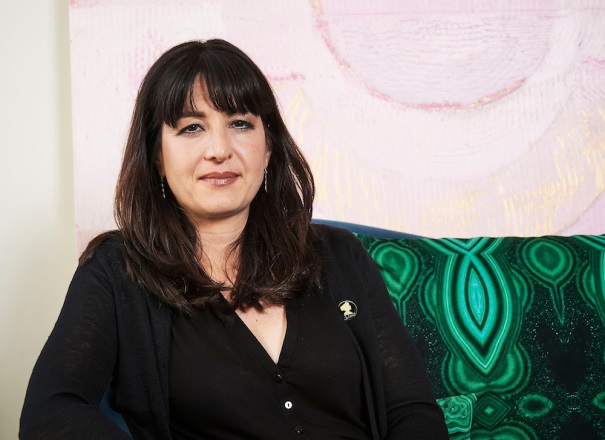INTERVIEW | Pamela Green, director of “Be Natural: The Untold Story of Alice Guy-Blaché”
Award season is here, and the upcoming Golden Globes have made history by nominating three women in their “Best Director” category. To honor that long overdue achievement I thought it would be the perfect time to talk with filmmaker Pamela B. Green (featured image) about her documentary “Be Natural: The Untold Story of Alice Guy-Blaché.” If you don’t recognize the name in the title, unfortunately, you’re not alone. Guy-Blaché was born in 1873, she was French, and oh yes, she was the world’s first female filmmaker. I recently spoke with Green about her decade-long journey in bringing her documentary to fruition and how it adds perspective to the present-day challenges of female directors.
Green is no stranger to the documentary genre. In 2010 she co-produced the film “Bhutto” which earned her an Emmy nomination. Green also works in the world of creating main titles where her work can be seen in almost two-hundred films and TV shows. Her talent in storytelling through graphics, animation and editorial is immediately apparent in “Be Natural” giving it a pictorial style which is hard to turn away from. As it begins, she cleverly assembles dozens of Hollywood power players on-screen in little boxes (something we’ve recently become accustomed to, thanks to Zoom) all discussing how they’ve never heard of Guy-Blaché.
Of course, there are reasons why this pioneer has remained below radar. Unlike some other female directors including Mabel Normand, Ida Lupino and Jodie Foster, she wasn’t also an actress. “Her father wouldn’t allow it,” Green said. With narration by the aforementioned Foster, “Be Natural” brings together other female directors, including Gillian Armstrong, Ava DuVernay, and Patty Jenkins to discuss the impact Guy-Blaché had in an all male-oriented industry.
Guy-Blaché began her career as a secretary for a camera and photography supply company. Its new owner, Léon Gaumont (yes, of the namesake French major Gaumont), took her under his wing. She met several early film engineers, including Auguste and Louis Lumière. After attending a screening of one of their films in 1895 she asked Gaumont if she could make her own movie—he said yes. It was titled “La Fée aux Choux” ( “The Cabbage Fairy”) and by 1896, the world’s first, and at the time only, female filmmaker had arrived.
What made Guy-Blaché’s work innovative was the motifs that inspired her. According to Green, “her storytelling was ahead of its time. It covered racism, immigration and even planned parenthood.” Green adds, “she did so much in a short amount of time.” Case in point: by 1910 Guy-Blaché had traveled to America with her husband Herbert and set up Solax Studios in Flushing, Queens. Two years later they moved to Fort Lee, New Jersey, where a sign was placed over the studio titled Be Natural, a phrase she used while directing her actors. Just eight years later in 1920, Guy-Blaché had directed her last film, leaving behind an interesting and almost forgotten legacy. Although her career as a director terminated quickly she went on to live to 94.
Guy-Blaché’s unique subject matter in front of the camera included directing probably the first all-African American cast in the 1912 film “A Fool and His Money.” Behind the camera she experimented with color film decades before other directors. Also, in a bit of destiny, in 1913 she directed the first script sold by William Moulton Marston, creator of “Wonder Woman,” a film that would be directed by Patty Jenkins herself a century later.
Green is especially proud that “Be Natural” has helped preserve some of Guy-Blaché’s early films, all of which are over a hundred years old. Due to the press the documentary has generated, there will also be a pillar in Guy-Blaché’s name at the Academy Museum of Motion Pictures.
Green, like many others I’ve interviewed, considers herself not a female director but a director. However, the fact that this distinctive accolade has to be highlighted is still very indicative of the climate of women behind the camera. “Women have been marginalized in so many industries, but cinema is starting to populate the landscape.” And although gender equality is still out of reach the more projects women push down the pipeline, the closer they will come to achieving it. As far as the ongoing special distinctions such as the first female director to do this or that,” Green says that “we should celebrate the small victories.”
“Be Natural: The Untold Story of Alice Guy-Blaché” premiered in 2018 at the Cannes Festival in its Cannes Classics slate. It had its North American premiere at the Telluride Film Festival, was nominated for a Critics’ Choice Documentary Award and has received critical acclaim internationally and screened in over forty-two countries. It also recently aired on TCM.
What a captivating figure Guy-Blaché cuts. Not surprisingly, Green is currently writing a feature length film on Guy-Blaché. An avid lover of mystery, she’s also working on a female-driven detective series titled “Aces Never Sleep.”
“Be Natural” can be streamed or purchased on Amazon Prime
Rudy Cecera is contributor to Screen Comment (@RComwrit22), he regulary writes about women filmmakers, from Mabel Normand to Illeana Douglas.









